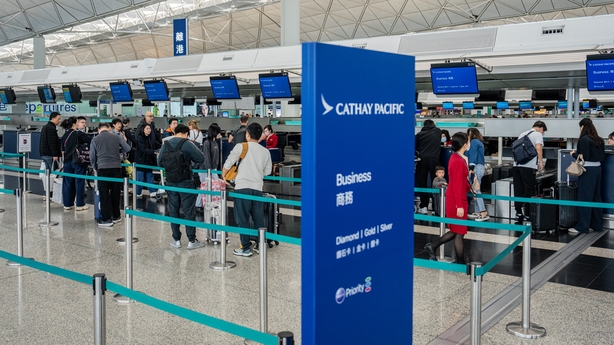Cathay Pacific Airways has today reported marginal full-year profit growth, but airfares fell because of intense competition as Asia's airlines continue to restore seat capacity after the pandemic.
Hong Kong's flagship airline posted a 1% rise in group net profit to HK$9.89 billion ($1.27 billion) for the year ended December 31, beating estimates of HK$8.49 billion forecast, supported by stronger cargo demand, more passengers, lower fuel prices and cost efficiencies.
Shares in the Hong Kong-listed carrier closed down 1.8% after jumping almost 4% to their highest since May 2019 after the results were announced.
Cathay Pacific's full-service airline, however, saw its annual yield, a proxy for airfares, fall 12%, while yields at the group's fully owned low-cost carrier HK Express fell 23% year-on-year.
Regional air fares are back to normal, but long-haul ticket prices have room to fall further, CFO Rebecca Sharpe told a briefing.
CEO Ronald Lam said this trend was expected, and that the group had added around 30% more passenger capacity this year.
Passenger yields and ticket prices have been softening globally from Covid-19 era highs, as airlines bring planes back after pandemic travel restrictions were lifted.
Hong Kong and mainland China emerged from those much later than other parts of the world and international capacity has still not been fully restored.
HK Express, which Cathay bought in 2019, reported a full-year loss of HK$400m compared to a HK$433m profit the year before.
Cathay attributed the drops at HK Express to intense price competition on regional routes pushing airfares down, and industry-wide issues with the Pratt & Whitney engines that power its Airbus A320neo planes, which grounded some aircraft in 2024.
Aviation consultancy OAG rated HK Express the fastest growing airline of 2024.
"A path to sustained profitability can be expected as (HK Express) continues to grow and increase its efficiencies," Cathay said.

Based at the world's busiest cargo airport, Cathay Pacific is one of Asia's largest cargo carriers and has benefited in recent years from rising volumes of e-commerce out of China.
Cargo yields rose 3% on-year, but the company warned that developing global trade conflicts could pose challenges to its freight business.
"The cargo outlook is very uncertain," Lam said, adding that so far Cathay had not seen any major impact.
Many carriers, including US and European Union airlines, avoid Russian airspace following the war in Ukraine. Cathay still flies over Russia for some North American routes, but not European routes.
Lam said if the circumstances of the Russia-Ukraine conflict change, the airline might consider new routes over Russian airspace.
This is Cathay's second consecutive annual profit following three years of losses over the pandemic, during which it made heavy layoffs.
Cathay Pacific's revenue for the year jumped 10.5% to HK$104.37 billion, in line with a Visible Alpha consensus of HK$104.74 billion. This was the first time revenue had exceeded HK$100 billion since 2019, CFO Sharpe said.
After a 2023-2024 phase of rebuilding and re-hiring staff, the airline is now investing HK$100 billion over seven years, the majority of which will be in new aircraft.
Cathay said it was now expecting the first delivery of Boeing's long-delayed 777X widebody jet in early 2027.
The investment comes as Hong Kong airport in November began operating three runways in a significant capacity expansion.
Cathay Pacific's profit included a one-off gain of HK$578 million from a dilution of its interests in Air China and Air China Cargo.

